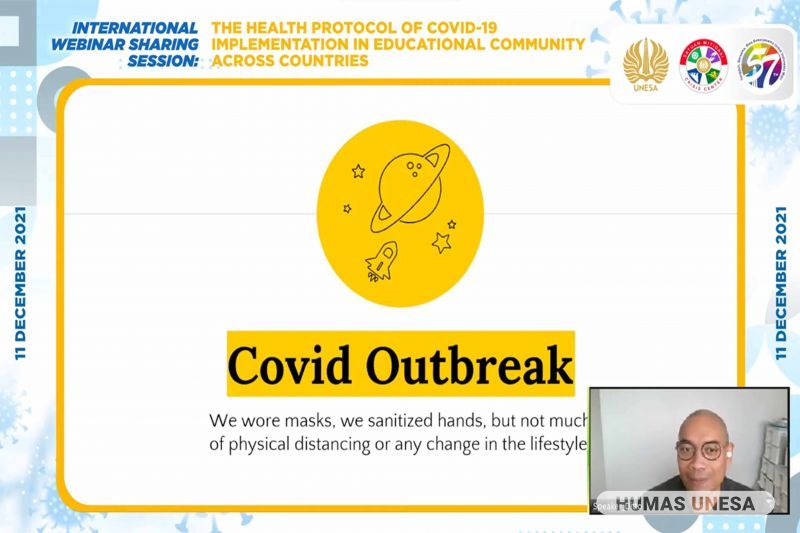
www.unesa.ac.id
Unesa.ac.id, SURABAYA-Covid-19 is still endemic. The emergence of a new variant, Omicron in several countries, has made governments extra vigilant in various fields, including the education sector, which is currently entering gradual and limited face-to-face learning.
In order for the education process to remain effective and safe during the pandemic, the UNESA Mitigas Crisis Center (SMCC) Unit held an International Webinar on 'The Helat Protocols of Covid-19 Implementation in Education Community Across Countries' on Saturday, December 11, 2021.
Head of SMCC UNESA Dr. Diana Rahmasari, S.Psi., M.Sc., stated that the webinar was aimed at increasing awareness of the presence of a new variant of Covid-19. In other words, as an anticipation effort so that the new variant does not 'drop' in the country. "How to do it, of course the key is in awareness and discipline of the process at all times," he said.
In addition, it is also to discuss effective anticipatory efforts through various experiences of implementing health programs in various countries. Especially in the world of education. "Certainly each country has its own solution in implementing health protocols and handling education in the COVID-19 pandemic. Hopefully from here we can find the right formula for the future," he said.
The webinar was attended by cross-country experts; 1) Prof. Tatyana Angelova, Ph.D. Faculty of Slavic Studies Department of Bulgarian Language Teaching Sofia University; 2) HS-Prof. Mag. Dr. Toblas Buchner of Inclusive Education University College of Teacher Education Upper Austria; 3) Erika Mendoza, M.Sc., International School of Amsterdam;
In addition, 4) Vincentlus Rumawas, Design of Marine Systems, Public Relations Factors in Ship Sedign and Operation Norway; ast. Prof. Ditto Prihadi Kususanto, Ph.D., Head of Postgraduate Studies and Research Faculty of Social Science and Liberal Arts, UCSI University, Kuala Lumpur; Dr. Sonny Harry B. Harmadi, S.E., M.E., Head of Behavior Change of the Covid-19 Handling Task Force.
Sonny Harry B Harmadi explained that the handling of Covid-19 in Indonesia is one of the best in the world. The government managed to reduce the active cases of Covid-19 to minus 99 percent within five months. This is in line with the government's efforts to encourage the acceleration of vaccination throughout Indonesia, including testing. Currently, there are 145 million people who have received dose 1 of the vaccine. The second vaccine has been carried out by almost 102 million people, and the third dose of vaccine has been received by about 1.3 million people.
Meanwhile, for testing, in a day it can reach 29 thousand residents. In a situation like this, including the emergence of new ranks, various countries have increased the application of health procedures at various entrances and exits of their population. In Indonesia, including the education sector, efforts are being made to continuously improve prokes. "With various considerations, the quality of education must continue to be improved, while on the other hand the prokes must also be improved," he said.
Colleges must have a healthy campus program or strategy. 1) social and physical environment must be supported by healthy living behavior. 2) campus leaders must have commitments and rules. 3) healthy academic activities. 4) healthy students and staff. 5) Individual capacity to improve healthy life.
In addition, he continued, campuses must have Covid-19 warning standards which include; 1) medical and psychological hotline services, 2) healthy campus websites, 3) screening applications for campus residents, 4) Covid-19 educational media. "These are some things that universities must pay attention to in implementing prokes on campuses to minimize the spread in the campus area," he said.
Erica Mendoza, said that the current experience in her country is that all schools are required to test for COVID-19 every week. It is an Amsterdam government rule that applies. In addition, education on Covid-19 awareness is also given to children starting at the age of 8 years. It is hoped that children will know a healthy environment and understand the factors that spread COVID-19.
This method, he continued, was effective in reducing the number of cases there. Adaptive attitudes supported by early self-awareness such as wearing masks, washing hands, maintaining distance and awareness to participate in vaccination programs are the keys to life in the new norm.
The same thing was conveyed by the handling of preventing the spread of COVID-19 in Austrian schools, which was conveyed by Professor Toblas Buchner. In Australia, he said, each school has its own rules regarding prokes. However, they still refer to the general rules set by the government.
ast. Prof. Ditto Prihadi Kususanto, also explained about the adaptive attitude that should be had at this time. According to him, on the one hand, many people do not want to follow the changes. Like not wanting to switch offline activities to online or vice versa. If the pandemic is considered safe to return to face-to-face meetings, then it can be done. However, still pay attention to prokes as an anticipation effort. In addition, at times like this, antipathy or closing oneself to change must be rethought. As long as change is good, adaptation is key, especially during this pandemic. [UNESA PR]
Author: Faizur
Editor: @zam*
Share It On:






